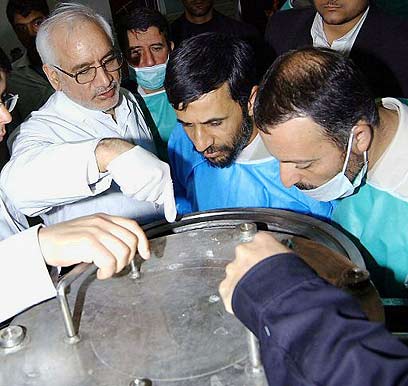
How nuclear equipment reached Iran
While the Security Council has banned companies from supplying Iran with goods that may be used in nuclear program, ayatollah regime continues to achieve its goal. One case outlines how order of 108 pressure gauges to Shanghai ended up in Tehran
Early last year, a Chinese company placed an order with a Taiwanese agent for 108 nuclear-related pressure gauges. But something happened along the way. Paperwork was backdated. Plans were rerouted, orders reconfigured, shipping redirected.
And the gauges ended up in a very different place: Iran.
The story behind the gauges shows how Iran is finding its way around international sanctions meant to prevent it from getting equipment that can be used to make a nuclear bomb. At least half a dozen times in recent years, the Persian Gulf nation has tried to use third countries as transshipment points for obtaining controlled, nuclear-related equipment.
In the case of the pressure gauges, it succeeded. In the process, the Swiss manufacturer and the Swiss government were duped, a Chinese company went around its own government's prohibition on moving nuclear-related equipment to Iran, and Taiwanese authorities showed themselves unwilling or unable to get into step with the international community.
The deal was a huge victory for Tehran, which had been seeking the gauges for months, said nuclear proliferation expert David Albright, president of the Washington-based Institute for Science and International Security. It also reflected the uneven enforcement of international sanctions against Iran, at a time when the US and other Western countries are pushing hard to expand them.
"The (Iranian) government looked everywhere - Russia, Europe, the US, and they were being thwarted by the international community," Albright said. "It's really unfortunate they succeeded in using this Taiwan-China connection. ... This case is a wake up call of the importance of universal and timely application of sanctions on Iran."
Iran says it wants to enrich uranium to generate nuclear power, but the West fears that it actually seeks weapons capabilities.

Iranian president at Natanz nuclear facility (Archive photo: AFP)
It's impossible to verify how Iran is using the gauges, also known as pressure transducers or capacitance diaphragm gauges, which have numerous commercial applications in machines that employ pneumatic or hydraulic pressure. But experts say the large size of the order suggests very strongly that they are for centrifuges to churn out enriched uranium.
As of last November, Iran had 8,692 centrifuges, of which 3,936 were running, according to the International Atomic Energy Agency. Each centrifuge normally requires a transducer, though a single gauge can also serve up to 10 linked centrifuges.
"The gauges are extremely useful to them," said Ferenc Dalnoki-Veress, a physicist at the James Martin Center for Nonproliferation Studies at California's Monterey Institute of International Studies. "It's a very big deal."
'Heli-Ocean broke no laws'
At first, the transaction seemed above board.
A January 24, 2009, purchase order shows that Roc-Master Manufacture & Supply Company ordered the gauges for delivery to its Shanghai base. The order - in the amount of $112,303.72 - was placed with Heli-Ocean Technology Co. Ltd., the Taiwanese agent for Swiss manufacturer Inficon Holding AG. Inficon, together with MKS of Andover, Mass., produces most of the world's supply of this type of transducer.
On February 6, Heli-Ocean received an initial payment from Roc-Master and placed an order with Inficon for the transducers, documents show.
Then the situation changed.
Roc-Master issued a revised purchase order, backdated to January 24, instructing Heli-Ocean to ship the transducers not to Shanghai, but to the Tehran airport. The consignee is named as Moshever Sanat Moaser, an Iranian company described on its website as a provider of specialty alloys and industrial parts.
The second purchase order also increased the amount to $145,800, almost $33,500 more than the original, without explanation.
European governments have been stopping nine out of 10 Iranian attempts to get pressure transducers, according to European intelligence, Albright said. One European country witnessed 40 procurement attempts from Iran for pressure transducers from August 2008 to August 2009.
Taiwan, however, let the shipment go through.
The transducers arrived in Taiwan on March 9, 2009, three days after they were shipped from Switzerland, according to a Taiwanese freight forwarder's document obtained by the AP. They were reported to Taiwanese Customs on March 10, the document shows.
A Taiwanese official with intimate knowledge of the deal told the AP they were shipped from Taipei airport to Iran sometime in March. The official spoke on condition of anonymity because of the sensitivity of the information.
The official said Heli-Ocean broke no laws. He said the transducers sent to Iran were not sensitive enough to be placed on the island's control list and, as such, did not need a special customs declaration.










